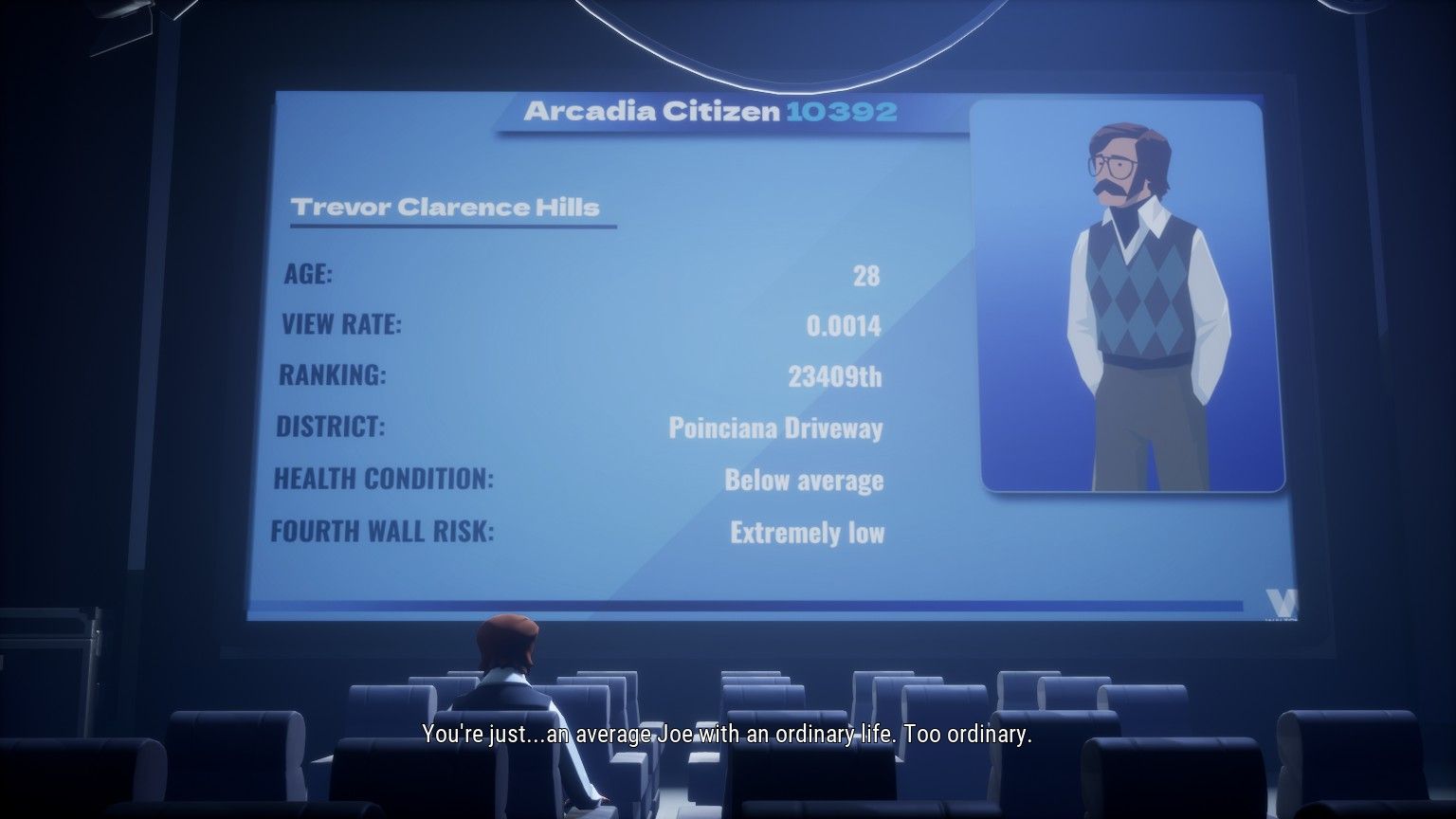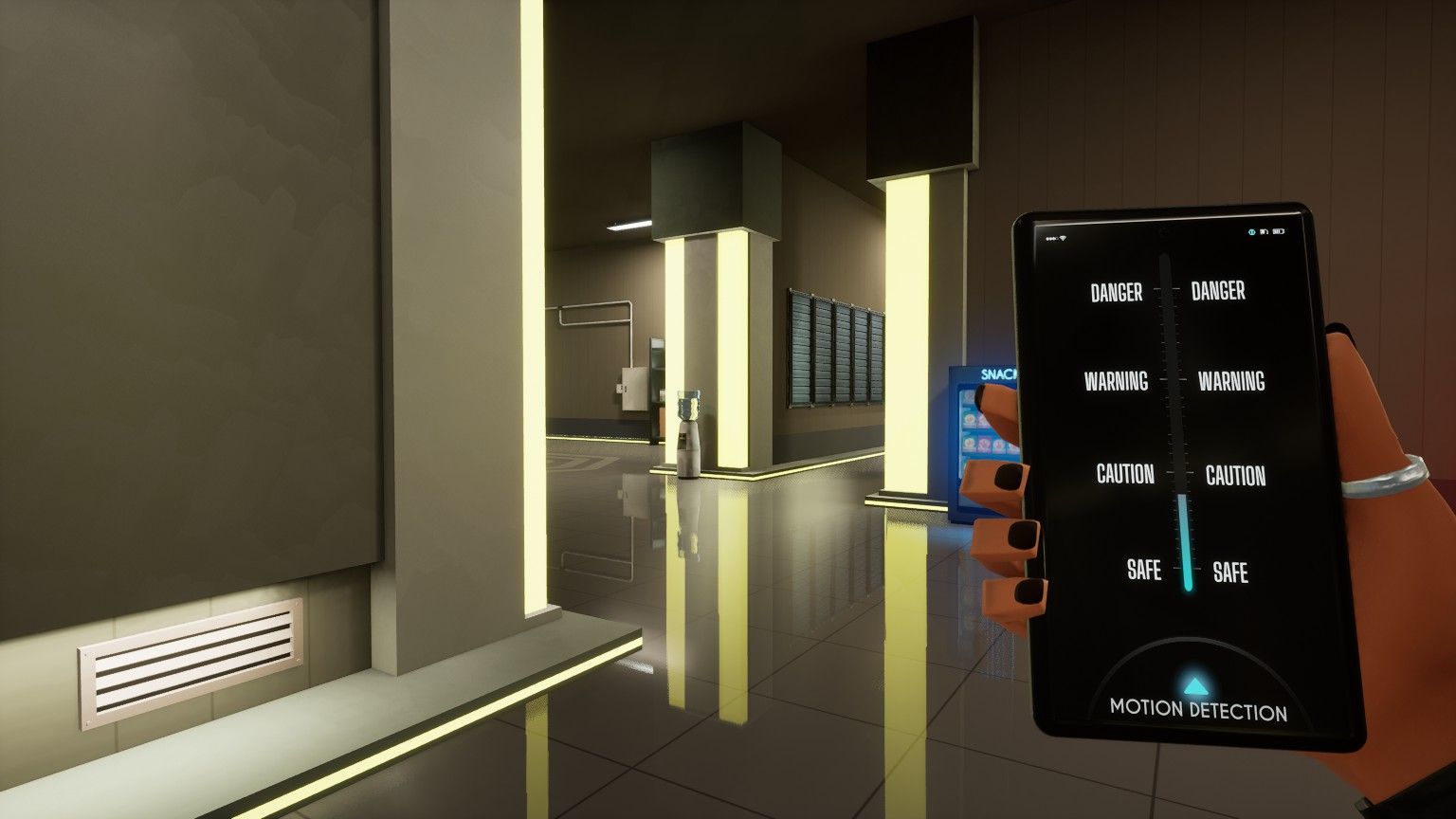American Arcadia: Life and Death on Film
It takes two...

The 1998 film The Truman Show is a film widely heralded as prescient. The story of a man unwittingly living his life on television is seen as predicting everything from the rise of reality TV and the surveillance state to influencer culture and the perpetual livestream. Far-sighted or not, the movie is a quarter-century old - the cultural markers are out of date and there are plenty of people trying to recreate it for the 21st century.
Enter American Arcadia, a game that mingles The Truman Show with a bit of The Fugitive and gives the whole thing a groovy 70s gloss. This time, the audience is along for the ride, aiding one man's desperate escape from a fictional paradise - and in doing so, it weaves a story deeper than that of its progenitor.

Trevor Hills leads an oppressively boring life - and that's exactly how he likes it. His friends (insofar as he has friends) chide him for being a stick in the mud, but Trevor sees nothing wrong with a life of work, TV and sleep. It helps that he lives in Arcadia, a miraculous city of the future where the weather is always fair, friendly robots are on hand to fix what's wrong and the worst that ever happens is an argument between friends. All of this is the dream of entertainment magnate Elijah Walton, a dream realized by his heirs and the people at Walton Media, the company he founded.
Suddenly, chaos begins to creep into Trevor's life. It starts with random eerie happenings - lights abruptly going dark, monitors displaying cryptic messages, and music playing for no one but Trevor. Then he is notified that he has won an "Edge Travel Grant," a prize that he never applied to win. On his way to the boss's office, he is contacted by a woman named Angela who informs him that he will be killed if he accepts his prize.
As he flees from the "travel agents," Trevor finds his way into the bowels of Arcadia where he learns the first of many shocking truths: Arcadia is, in fact, the stage for the largest reality TV show ever created, one in which viewers can follow any of the tens of thousands of unwitting stars. But ratings are slumping, and that means cutting costs - starting with the Arcadians with the worst metrics. Right now, that's Trevor, and his only hope of avoiding permanent cancellation is to get out of Arcadia at all costs.

The bulk of American Arcadia's gameplay consists of puzzle platformer segments. Trevor Hills is a desk jockey with no weapons, equipment, or noteworthy skills, so his options are limited - he can jump, grab ledges, move certain objects, and run for his life from the people and machines who are after him.
Trevor isn't alone, though - he has Angela, a Walton Media employee who's working from the inside to expose Arcadia. Thanks to an illegal admin key, Angela has access to the machines and devices that make Arcadia work as well as a network of closed-circuit cameras to follow Trevor's movements. By controlling elements in each area, she can help Trevor evade capture and get around obstacles.
Trevor and Angela are controlled independently - Trevor with the left stick / keyboard, Angela with the right stick / mouse, with different action buttons for each. This means that it is possible to control both of them at the same time, and it's even necessary for certain sequences (i.e. chases) in which split-second decisions are required. There's even one section in which the characters have separate objectives that have to be completed simultaneously, a task that will really put the player's multitasking skills to the test.

On occasion, Angela will need to get away from her desk and complete a task in the real world. At these times, gameplay switches to a first-person perspective to solve puzzles. These tasks can range from sneaking equipment into Arcadia to aid Trevor's escape, hastily sanitizing her apartment of any signs of subversive activity, or even breaking into a high-security control center. Much like Trevor, Angela isn't much of a secret agent, so clearing these sections requires a deft touch.
By and large, the puzzles in American Arcadia are sensible. Sure, there are a few of those treacherously old-school brain burners where the player needs to know exactly what to do, but usually, the solution can be gleaned using real-world logic and careful observation. Getting stuck is seldom an issue as long as the player can operate under pressure.
Pressure is a watchword throughout American Arcadia. Both protagonists are in a constant state of jeopardy, and the game lets you know it - whether that means a desperate foot pursuit across rooftops or a grilling by a cold-blooded corporate spy hunter. It gives the game a cinematic feel without ever taking autonomy away from the principals.
Adding to that cinematic character is the game's visual style. The two key elements - low-poly 3D and an exaggerated 70s aesthetic - are not new, but they combine very well. There's also a real sense of contrasts, as Trevor's pastel-colored world stands out from both the gloomy minimalism of the Walton Media offices and Arcadia's dingy backstage areas.

But let's take a moment to address American Arcadia's connection back to its predecessor. The game at times pays homage to The Truman Show - i.e. the first recipient of an Edge Travel Grant is said to have been sent to Fiji, the same purported destination as Truman Burbank's first love. This is certainly not the first media property to try and update The Truman Show, but I'd argue that it did so the best, and may even have surpassed its inspiration.
American Arcadia didn't merely update The Truman Show to reflect the modern media environment, nor did it stop at adding the elements you'd expect in an interactive experience. The narrative goes a lot deeper, exploring the legal, social, technological, logistical, and even creative issues that would arise from keeping so many people as unwitting prisoners in a panopticon. Trevor Hills is guided by more than mere sentiment, and his journey of discovery is a lot more touching.
There are a lot of games that aspire to make some "deep" statement on society, but American Arcadia accomplishes the same thing without a heavy hand. Walton Media is full of sinister secrets, and each twist of the story is an invitation to discussion on topics such as the dehumanizing nature of metrics, what it means to live in a society that values being interesting over being virtuous, and even if we're the real bad guys for finding this all so compelling.
And if that's not your bag? Well, it's still good as a video game, and that's all you need.
